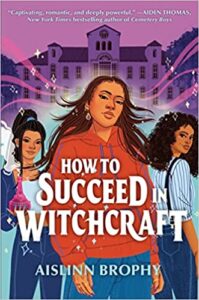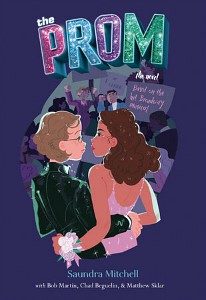Buy this from Bookshop.org to support local bookstores and the Lesbrary!
At the top of the T.K. Anderson Magical Magnet School’s leaderboard is Shay Johnson. One of the most impressive and successful witches among her peers, this almost guarantees her the coveted Brockton Scholarship which would allow her to register to the university of her dreams—an education that her parents otherwise cannot afford. Her main obstacle is her years-long rival: Ana Alvarez. When both girls get recruited by their drama teacher and head of the scholarship committee, Mr. B, Shay wearily accepts the starring role to ensure her scholarship win, all while her professor’s behaviour becomes increasingly inappropriate and her rivalry with Ana slowly turns into something more.
If you’re looking to tap into some great YA fiction, I cannot recommend this book enough. Brophy managed to write a perfect balance of entertaining and witty banter, a narrative voice that is fun and easy to follow, as well as some deep, rich, and complex conversations about abuse, manipulation, racism, classism, and homophobia.
Shay is such an incredibly funny main character, and young readers who feel pressured to overachieve in academics will be able to instantly relate to her. Throughout my own reading experience, I felt as though I was an older sister watching her sibling go through all the same mistakes I made at her age. It was truly endearing, and I loved following her through all the highs and lows of her academic journey and her love story. Brophy wrote an extremely realistic main character and gave her the space she needs to recognize, understand, and learn from her mistakes. They always included a ton of nuance in their characters’ conversations, the conflicts weren’t immediately resolved and brushed over anticlimactically, and they built a very relatable cast with some fascinating dynamics.
The element of the story that I believe was the most successful was the way in which Brophy melded their magic system so seamlessly into our modern-day world. Fantasy authors have a tendency to do a lot of fantastical world-building that is set in some real-world human setting, while simultaneously ignoring the tragedies and realities of our history. This book feels very contemporary, in that the magic bleeds into our societies exactly as they have been built, including the systems of oppression that exist in our modern world. Brophy uses witching and magic not to “escape” humanity as we know it, but specifically to address issues of racism, of class disparity, of homophobia, of abuse of power. Shay’s storyline is, at its core, deeply influenced by the fact that she is a Black lesbian who comes from a lower-class family, and her struggles as an obsessive overachiever are rooted in the expectations that have been laid out for her future by the society in which she grew up. It gave the book some wonderful depth, without necessarily becoming overly complex or inaccessible to its intended young adult audience.
The entire plotline surrounding the play itself was phenomenal, because Brophy managed to weave so many societal critiques together. Their teacher presenting it as an “inclusive” and “diverse” musical, only for him to deeply misunderstand and misrepresent his students’ racial backgrounds and ethnicities during the casting process, was a very accurate portrayal of people co-opting specific terms and ideologies to make themselves seem good and progressive, without actually having to care about the issues at hand. The story as a whole empathizes with teens who don’t know how to stand up for themselves and who realize the system is working against them, but also gives them some specific tools for calling out bigotry and abuse, especially when it comes from people in positions of power.
And, of course, I adored the sapphic romance in this. I was rooting for Shay and Ana the entire time, and it was so entertaining to watch our main character be so foolishly oblivious, in a way that is extremely realistic for a young, teenage lesbian. The rivalry between them makes it very easy for readers to become invested in their relationship and I loved how Brophy developed their love story in a way that felt very messy—i.e.: realistic for their age—as well as absolutely adorable. I also appreciate that Brophy didn’t shy away from using the term “lesbian” multiple times throughout the story, as it still feels very rare for authors in mainstream publishing to allow their young main characters to specifically label themselves as such.
If you’re looking for an easy read that is at times fun and light, but that nonetheless packs a punch when it comes to exploring its themes and the ultimate message, this is the perfect read.
Representation: Black, biracial, lesbian main character; Cuban, bisexual love interest; Filipina side character
Content warnings: grooming and manipulation by a teacher, racism, homophobia


